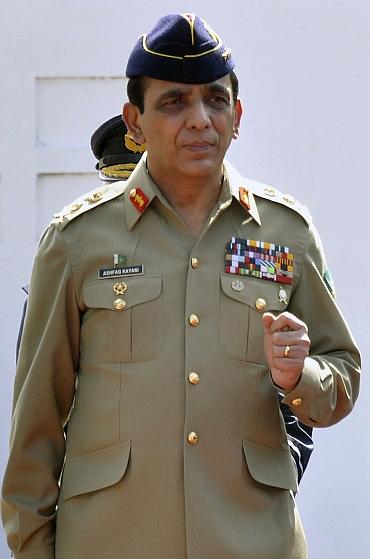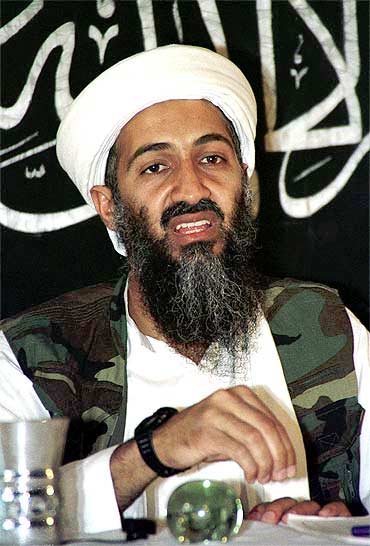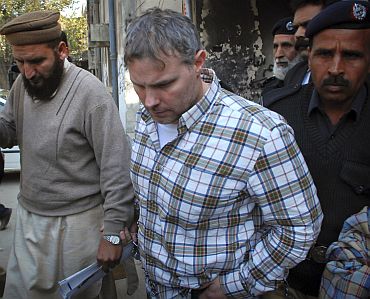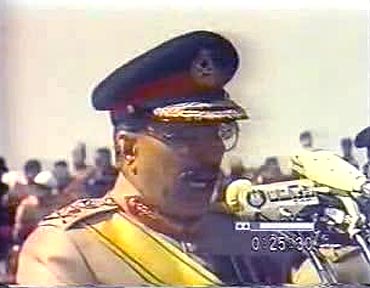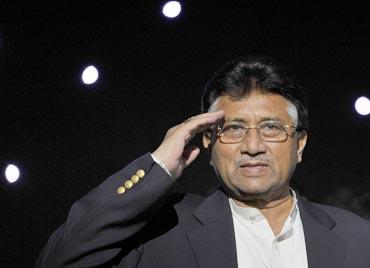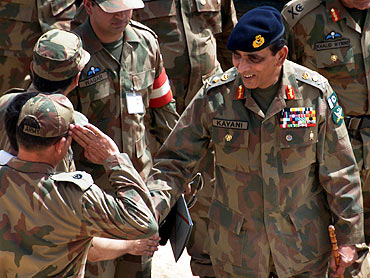 | « Back to article | Print this article |
Is a colonel's coup possible in Pakistan?
While the American mainstream media speculate about Pakistani Army Chief General Ashfaq Pervez Kayani being deposed in a coup, the reports have very little domestic corroboration, says Amir Mir
Two mainstream American newspapers, the Washington Post and the New York Times, have published front-page articles in a short span of one week, speculating on the likelihood of an anti-United States "colonels' coup" in Pakistan against the Army Chief General Ashfaq Pervez Kayani for being too pro-American.
Appearing at a time when the Pakistan-US ties are touching their lowest ebb in recent years, the US media reports said that the rank and file in the Pakistan Army is anti-American and greatly angered by Kayani for his pro-US policies.
Both American newspapers went to the extent of claiming that the intra-army rage in the lower and middle ranks of the Pakistan Army has reached such an extent that Kayani is fighting for his survival. These reports have mostly emanated from foreign sources, and there is very little domestic corroboration, but it seems reasonable to conclude that there may be a grain of truth in them.
However, the Pakistani military circles have strongly rejected all such media reports as part of a malicious campaign being launched against the country's khaki leadership because of its refusal to bow to American pressures on several issues of national importance.
Click NEXT to read further...A love affair going sour
The Pak-US military ties were severely strained when US Special Forces conducted a covert raid in the garrison town of Abbottabad, 60 kilometres north of Islamabad, on May 2, 2011, and killed Osama bin Laden. The Pakistani military and intelligence establishment was greatly embarrassed and angered when the Obama administration claimed sole responsibility for the military operation in defiance of a Pak-US agreement.
The Obama administration's disclosure that Osama's Abbottabad hideout was under extensive surveillance by American spies from a nearby Central Intelligence Agency safe house, further strained these ties, prompting the military and intelligence establishment of Pakistan to halt all counter-terrorism cooperation with the US.
In the aftermath of the Abbottabad military operation by the Americans, the Pakistani military leadership took a number of drastic steps to limit the growing sway of American intelligence network in Pakistan, which annoyed the Obama administration.
For instance, the US was asked to cut down the number of CIA agents in Pakistan besides curbing their activities in the country. Then General Kayani reportedly told the director of CIA, Leon E Panetta, during a recent visit that Pakistan would not accede to his request for independent operations by the agency, and any decision about a military operation in North Waziristan would not be taken under any foreign pressures.
These developments were followed by the recent arrests of five Pakistani agents who had been working for the CIA and passing on information about bin Laden's Abbottabad hideout. This has further dented Pak-US ties, giving the obvious feeling of a love affair going sour.
Click NEXT to read further...
Things going rapidly downhill between US and Pakistan
Not so long ago, senior US government and military officials were carrying out a self-critique of past attitudes towards Pakistan, vowing to move forward from a purely transactional to a strategic relationship promising long term mutual benefits.
But things have changed rapidly, and are going downhill. Starting with the Raymond Davis episode and perambulating through the fiasco of the May 2 US raid, it is easy to conclude that there has been an irretrievable breakdown in trust between the two sides -- which is always a somewhat precarious and threatened species.
Analysts say by striking a fiercely nationalist pose, the military and intelligence establishment may be trying to reverse the pressure of adverse opinion about their readiness and competence that has overtaken public perception of late, reflected in the barrage of criticism unleashed against these institutions in the media in the aftermath of the Abbottabad raid and the Mehran base attack.
That barrage of criticism also invited the attention of the recent Corps Commanders Conference, whose minutes [as made public by a military spokesman through a press release] could only be described as a blunt warning to the critics to cease and desist.
Click NEXT to read further...Fundamentalism became Pakistan's quasi-official creed
An unusually lengthy statement issued by a military spokesman on June 10 summarised the Corps Commanders Conference by addressing the Abbottabad raid, criticisms of the Army, the Pak-US military relationship and American aid.
Going by the statement, the participants of the 139th Corps Commanders Conference were unanimous that Pakistan's 'military-to-military' ties with the US should be reassessed in light of the post-May 2 joint parliamentary resolution of May 14, 2011, adopted by a joint session of the upper and the lower houses of the parliament, asking the Army to put an end to the American trespass into Pakistani territory as well as the US drone attacks on Pakistani soil.
Military circles close to Kayani say the proceedings of the conference must have been taken by the Americans with a pinch of salt, prompting them to initiate a campaign in the US media against General Kayani with a view to erode his authority and pave the way for his ouster.
However, some analysts say the proceedings of the conference actually reflected that an overwhelming majority of the corps commanders are anti-US.
After General Zia-ul-Haq put an official seal on Islamic fundamentalism by raising Islamic militias to help the Americans fight out the Russian forces from Afghanistan, fundamentalism became Pakistan's quasi-official creed.
The Cold War ended, the Soviet Union perished, but the Islamic militias keep growing from strength to strength due to the Pakistani military and intelligence establishment's support which had been using them as mercenaries in India and Afghanistan to pursue its so-called geo-strategic agenda in the region.
In fact, the all-powerful army has remained the law in Pakistan since 1958 when Field Marshall General Ayub Khan assumed political power through a coup d'etat.
Click NEXT to read further...Kayani cornered by American largesse
Constitutions have come and gone since then, but not the military's grip on the nation and its mind. And all this could not have been possible without a tacit backing of the US to the successive military regime in Pakistan.
Therefore, there are those who describe the Pakistani military as a creation of the US and a darling of the Pentagon, having been its Cold War partner since the Baghdad Pact that led to the formation of the Central Treaty Organisation and the South East Asia Treaty Organisation.
Not long ago, Kayani was also considered to be a darling of the Pentagon, like his predecessors General Zia-ul-Haq and General Pevez Musharraf who ruled Pakistan for almost two decades with full American backing.
But things have changed in recent months and Kayani seems to have fallen out of favour with the decision-makers in Washington, as indicated by some recent American media reports.
Military analysts say noises about a "colonels' coup" in Pakistan may be exaggerated. But they say the general must be under pressure from within and without. The arrangement that Kayani had worked out after taking over from General Musharraf in 2007 brought the military power-without-responsibility.
Over time, his claims about non-interference with the elected government in Islamabad were eclipsed by the visible influence Kayani began to exercise in the civilian government's decision-making process.
Most importantly, as Army Chief, Kayani made himself indispensable to the US in its war against the Taliban in Afghanistan. Pumping in at least $2 billion a year as military aid, it is that relationship with the US that has now cornered General Kayani.
Subsequently, while General Kayani faces intense criticism by Pakistani media for the military failures in Abbottabad and Karachi during the Osama raid and the Karachi naval base attack, the American media reports that he is battling for his survival, amid mounting pressure from his Corps Commanders to take a tougher line against the United States.
Click NEXT to read further...Kayani trying hard to restore his Army's wounded pride
While a colonels' coup may yet be unlikely, Kayani finds himself pressed on the one hand by the US, with Pak-US ties at their lowest in years. On the other hand, the lower and middle ranks of the army have turned the heat on, as per the American media claims.
Indeed, with the soldiers' resentment to fighting their fellow Pakistanis, Kayani has had to distance himself from Washington, as evident from the proceedings of the 139th Corps Commanders Conference.
But how far those sitting in the Pentagon are going to let him get away without losing their plot in Af-Pak will determine how secure the disgruntled officers are going to let Kayani feel.
General Kayani is already making a conscious effort to win back the support of his constituency by making an extraordinary tour of over a dozen garrisons and mess halls during six weeks since the May 2 Abbottabad raid, addressing officers and troops, facing their wrath and fielding all kinds of questions. He is also reported to have expressed his sense of personal betrayal over the unilateral raid, saying that "military-to-military ties between Washington and Islamabad need to be redefined."
However, whatever sentiments his fellow khakis have about the United States, the fact is, the Pakistani officer corps comprises largely of people coming from the lower middle class strata of the society.
This breed is more interested in self-advancement and climbing the social ladder than in any sublime grand strategic heroic venture like a coup against their chief.
Their ultimate coup is getting a good Annual Confidential Report and getting promoted to the next rank. After all, Claus Von Stauffenberg, a German colonel who had placed a bomb in Hitler's bunker to kill him, was an aristocrat.
Vladimir Lenin, who led the Red Army to victory in the Russian Civil War, before establishing the world's first officially socialist state, and Mao Zedong, who led the Long March to victory in the Chinese Civil War, were both from the more well-off classes which is not the case with the Pakistani officers.
A majority of them comes from humble backgrounds, thus socially conservative and narrow in outlook. Therefore, there is hardly any chance of a "Colonels coup" against Kayani who is already trying hard to restore the wounded pride of his Army by adopting an anti-US stance.
